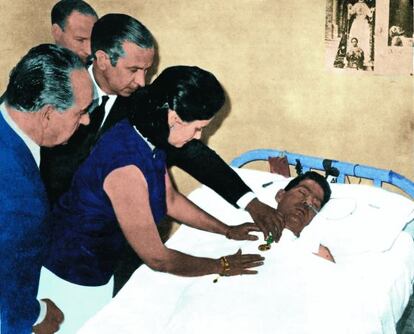Mártinez, a case apart
Atlético Madrid player's death led to more stringent checks

In 1964, when Vicente Calderón took over the presidency of Atlético Madrid, he made a raft of new signings to play in the King's Cup, which was then contested after the league had ended. Among them were a package of players from Betis: Luis Aragonés, who would make history at Atlético, Julio Santaella and José Miguel Mártinez.
Mártinez was a defender and defensive midfielder who made his name at Primera División Betis after playing in second-tier sides in his native Catalonia. In between, he was called up for military service in San Fernando, where he played for the local side and met his future wife.
Shortly after joining Atlético, the team embarked on a tour of South America. The day after a match against Peñarol in Montevideo, Mártinez was playing cards with some teammates when he said he felt unwell and went to his room. Santaella followed him later on and found him unconscious in bed. He was taken to the Británico hospital and diagnosed with mesencephalitis. He was in a coma.
Although the tour continued through Asunción, La Paz, Lima, Quito and Caracas, his teammates asked after Mártinez every morning. The news was never positive. Finally, almost a month after Atlético had left Madrid, Mártinez was transferred to a hospital in the Spanish capital where his condition made national headlines. His wife, Pepita Márquez, had discovered she was pregnant. At the same time it was recalled that during his debut for Betis in September 1962 Mártinez had received a blow to the head and was taken off at half time. A year later, against Pontevedra, he had been concussed. Had problems arisen that had not been detected by medical staff?
Mártinez's wife bid to have his death recognized as a labor accident
Weeks and months passed and Mártinez's condition did not improve. In 1967 his contract was due to expire and Atlético organized a charity match against a Liga 11 to raise funds for his continued treatment. State broadcaster RTVE paid to show the match, a large crowd turned up to watch and a novel idea was born: row 0 seats were sold across the country, an altruistic token ticket purchase. It was a huge success; the stadium raked in 1.2 million pesetas and row 0 3.1 million. With RTVE's contribution, the game raised 4.5 million pesetas, a huge sum for the time. Mártinez's son, who now appeared in the photographs with his mother by his bedside, was handed the 50,000th Atlético membership card.
But then time elapsed again. After Márquez footed the hospital bill for as long as she could, the National Sports Council took over and paid the costs until September 28, 1972, when Mártinez passed away after eight years in a coma.
Four years later, his wife launched a legal bid to have Mártinez's death recognized as a labor accident, which would have permitted her to claim compensation. Her lawyer argued that the blow to the head he received on his Betis debut and the concussion against Pontevedra were precedents to his death, which was therefore caused by professional activity. The case was dismissed and Márquez returned to San Fernando, where her son went on to play for the local side as his father had done.
Mártinez's case did set a precedent that exists to this day: clubs began to go to great lengths to prevent a similar occurrence. This was the case with Manuel Lasheras, whom Santiago Bernabéu had earmarked as successor to the great Di Stéfano. During a match against Rayo in 1965 he headed a goal and fainted. Despite scoring 33 goals, with five hat-tricks, that season he was not allowed to play again. Ramón, a winger who was a target for Atlético, was not signed due to a small heart anomaly. Curiously, he was still passed fit to be conscripted for national service.
Tu suscripción se está usando en otro dispositivo
¿Quieres añadir otro usuario a tu suscripción?
Si continúas leyendo en este dispositivo, no se podrá leer en el otro.
FlechaTu suscripción se está usando en otro dispositivo y solo puedes acceder a EL PAÍS desde un dispositivo a la vez.
Si quieres compartir tu cuenta, cambia tu suscripción a la modalidad Premium, así podrás añadir otro usuario. Cada uno accederá con su propia cuenta de email, lo que os permitirá personalizar vuestra experiencia en EL PAÍS.
¿Tienes una suscripción de empresa? Accede aquí para contratar más cuentas.
En el caso de no saber quién está usando tu cuenta, te recomendamos cambiar tu contraseña aquí.
Si decides continuar compartiendo tu cuenta, este mensaje se mostrará en tu dispositivo y en el de la otra persona que está usando tu cuenta de forma indefinida, afectando a tu experiencia de lectura. Puedes consultar aquí los términos y condiciones de la suscripción digital.









































